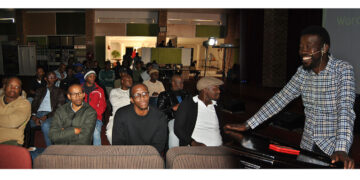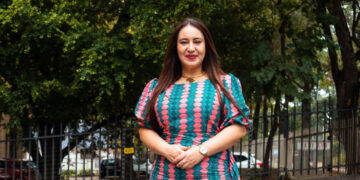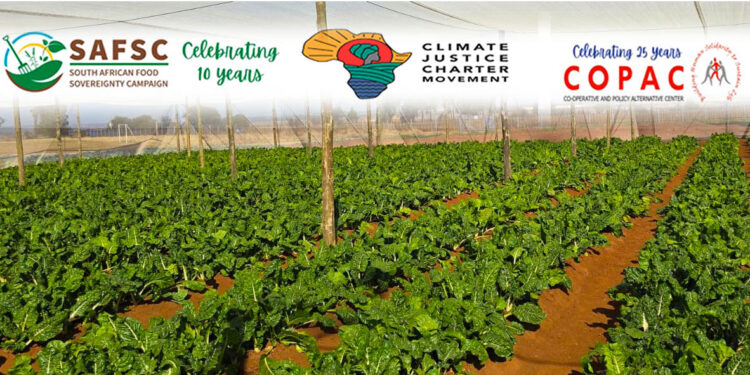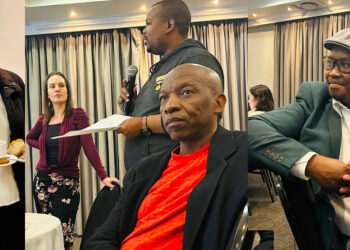On October 16, World Food Day, the South African Food Sovereignty Campaign successfully mobilized small-scale food producers, informal traders, and supporters to march to Parliament. Our goal was clear: to demand immediate democratic systemic reforms prioritizing food sovereignty, social justice, and environmental regeneration.
During the march, we presented a Memorandum of Demands, which included calls for Parliament to adopt critical democratic systemic reforms such as the Feed Ourselves Through Food Sovereignty Policy and the People’s Food Sovereignty Act. These demands reflect the needs and voices of our communities, as expressed through extensive dialogues held across the country.
Memorandum of demands to: Honourable Minister Dion George of Forestry, Fisheries, and the Environment, Honourable Minister John Steenhuisen of Agriculture, Honourable Minister Anton Bredell of Local Government, Environmental Affairs and Development Planning, Honourable Minister Ivan Meyer of Agriculture, Economic Development and Tourism, Honourable Deputy Mayor Eddie Andrews, Portfolio: Spatial Planning and the Environment, Chairperson Dave Bryant of the Western Cape Provincial Parliament, SALGA and the Cape Town Metro FROM: Climate Justice Charter Movement (CJCM) & South African Food Sovereignty Campaign (SAFSC) DATE: 16 October 2024 SUBJECT: Demand for Immediate Action on Food Sovereignty and Climate Justice – Together let’s end hunger, thirst, and climate harm and protect nature!
1. Introduction The South African Food Sovereignty Campaign and the Climate Justice Charter Movement, representing and together with small-scale farmers, fisherfolk, informal traders, farmworkers, and communities across South Africa, hereby present the following urgent demands. These demands form part of our commitment to accelerate the deep just transition toward food sovereignty, climate justice, and climate jobs for all.
2. End Hunger 2.1 The majority of the country is facing a desperate situation with high food prices and soaring living costs. Millions are in a desperate situation and find it hard to survive. Food inequality expressed through hunger, malnutrition, and food scarcity is a burden carried by poor households, grassroots women, the landless, and children. Our government failed us during Covid 19 and is failing us now.
2.2 We demand an affirmation of section 27 of the Constitution to affirm the right to food in concrete terms. In this context, we call upon our Parliament to adopt the revised Food Sovereignty Act No. 1 of 2024 and Feed Ourselves Through Food Sovereignty Policy as comprehensive frameworks to address the systemic inequalities and climate vulnerabilities that threaten our communities. Let’s end hunger together, ensure food justice, and prepare our food system for worsening climate shocks.
2.3 The Food Sovereignty Act is informed by lessons learned from Covid 19 and the Food Sovereignty Act 2018 developed during the drought. Despite our staple crops and livestock production collapsing during the drought the Food Sovereignty Act of 2018 was ignored by the parliament and seven government departments. This time after more dialogues in several provinces, with input from scale fishers, informal traders, the landless, communities, and the public we are saying again: the corporate-controlled food system is in crisis and does not meet our needs. It is also exposing the country to the increasing risk of climate famine.
2.3 We demand a triple transition of the food system beyond an unjust, unsustainable, and uncaring big farmer, corporate, and supermarket-controlled food system. We demand a food sovereignty commons system that is democratically planned to meet the needs of all. We demand support for household, community, micro farmer, small scale farmer, and informal trader food sovereignty commons systems in our communities. We demand support for coastal communities and subsistence fishers to be the stewards of our coastal food commons.
2.4 Such a triple transition is the backbone of a Climate Emergency Social Contract which we will continue to build in communities, villages, towns, and cities. The crisis of political leadership in South Africa will not hold us back.
3. End Thirst 3.1 Our water systems are in crisis. The quality, governance, and delivery of water in many parts of the country is showing signs of state failure. From Johannesburg to small towns water shedding is a reality and we are becoming a country of state-induced droughts’ ‘governance droughts’. We demand urgent measures such as fixing leaks, employing skilled personnel to run water systems, investing in water system maintenance and upgrading, cleaning our rivers, and designing for water harvesting and micro dams, polluters must be held accountable, and ensure the public has control through recognition and accountability to community water commons committees. Water is a public good that we should all manage.
3.2 The People’s Food Sovereignty Act and Policy calls for the democratic management of our water commons in the food system. Industrial-scale farming controls 62% of our water resources. This is unacceptable in a drought-prone country and we have to ensure democratic planning of our triple transition informs water sharing in the food system and in society more generally. We again demand the adoption and implementation of the Food Sovereignty Act and policy as the basis for a Climate Emergency Social Contract to accelerate transformative decarbonization, adaptation, and regeneration of our water systems.
4. End Climate Harm 4.1
South Africa’s political parties do not have serious commitments to the worsening crisis as witnessed in the recent national elections. As a result, communities ravaged by climate extremes are desperate for climate justice. Tongaat impacted by a devastating tornado is still not receiving the immediate support and resources from the government to rebuild the shattered lives of people. This is one of many communities trying to find their way back after a climate shock. South Africa is facing more climate extremes including a 3C increase in regional temperatures in the next few years when the world overshoots 1.5c globally. This will be devastating for a country unprepared.
4.2 We reject offshore oil and gas extraction, fracking, and nuclear power. We demand a deep just transition plan in the energy sector that centres the needs of workers and communities. We also demand that Western governments seeking to fund the transition of ESKOM commit to a deep just transition plan led by workers and affected communities.
4.3 In 2020 the Climate Justice Carter Movement, endorsed by 285 organisations brought the world’s first Climate Justice Charter to parliament for adoption as per section 234 of the constitution which provides for charters to be adopted. This was ignored by the South African parliament despite repeated recalls by the CJCM. Today we demand the adoption of the Climate Justice Charter which provides a pluri-vision to address the legacies of apartheid, the current polycrisis, and which seeks to ensure a democratic, just, and liveable South Africa.
4.4 Moreover, we demand an inclusive national dialogue to set a consensus framework for the Government of National Unity and such a dialogue must place at its center for deliberation a Climate Emergency Social Contract for South Africa based on the Climate Justice Charter. Again we will not wait for failed political leadership to achieve such a Climate Emergency Social contract. Through our activism in communities and workplaces and as we confront the worsening crisis in the lived experience of people, from hunger to thirst to climate harm, we will build this Climate Emergency Social Contract from below.
5. Protect Nature
5.1 The government is increasing mining, intensifying food production for export, failing to police pollution, and allowing developer-driven development of urban spaces. As a result sensitive ecosystems are being destroyed in our rivers, oceans, and in our landscapes. We demand an end to this failure of governance and a recognition of the need to care for more than human life forms part of the web of life.
5.2 Animals and ecosystems are not commodities to be bought and sold. Biodiversity strategies that treat wild nature as such and as part of game farms must be stopped. We also reject false climate solutions like carbon offsets and credits as the basis to protect our biodiversity. We demand a Climate Emergency Social Contract that protects the web of life and ensures resilient ecosystems, affirms decolonial conservation and commoning through the creation of millions of climate jobs. All our marine protected areas, national parks, and sensitive bioregions must involve communities historically dispossessed or in the immediate vicinity to ensure joint stewardship and care. From below we will work with communities to achieve this process of affirming the rights of nature, bio-diversity registers, and protocols.
Conclusion
We stand united in calling for the immediate recognition of these demands, critical to ending hunger, thirst, and climate harm, and protecting nature. The future of South Africa’s food system depends on a deep and triple-just transition that centers on the needs of the people and the web of life. This is crucial as a cornerstone of the Climate Justice Charter and Climate Emergency Social Contract for all in South Africa. United we can give an emancipatory future to the country, the planet, and future generations.
Warm regards,
Qhawekazi Mahlalela
National Coordinator
South African Food Sovereignty Campaign (SAFSC
Soweto Sunrise News


































